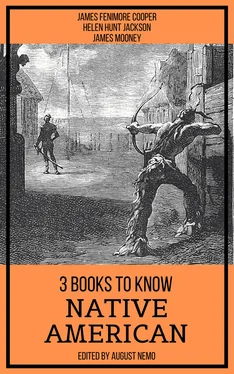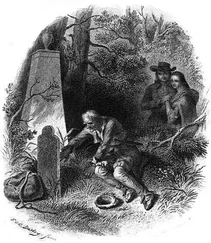“You have said enough, Major Heyward!” exclaimed the angry old man: “enough to make a volume of commentary on French civility. Here has this gentleman invited me to a conference, and when I send him a capable substitute, for ye’re all that, Duncan, though your years are but few, he answers me with a riddle.”
“He may have thought less favorably of the substitute, my dear sir; and you will remember that the invitation, which he now repeats, was to the commandant of the works, and not to his second.”
“Well, sir, is not a substitute clothed with all the power and dignity of him who grants the commission? He wishes to confer with Munro! Faith, sir, I have much inclination to indulge the man, if it should only be to let him behold the firm countenance we maintain in spite of his numbers and his summons. There might be no bad policy in such a stroke, young man.”
Duncan, who believed it of the last importance that they should speedily come at the contents of the letter borne by the scout, gladly encouraged this idea.
“Without doubt, he could gather no confidence by witnessing our indifference,” he said.
“You never said truer word. I could wish, sir, that he would visit the works in open day, and in the form of a storming party: that is the least failing method of proving the countenance of an enemy, and would be far preferable to the battering system he has chosen. The beauty and manliness of warfare has been much deformed, Major Heyward, by the arts of your Monsieur Vauban. Our ancestors were far above such scientific cowardice!”
“It may be very true, sir; but we are now obliged to repel art by art. What is your pleasure in the matter of the interview?”
“I will meet the Frenchman, and that without fear or delay; promptly; sir, as becomes a servant of my royal master. Go, Major Heyward, and give them a flourish of the music; and send out a messenger to let them know who is coming. We will follow with a small guard, for such respect is due to one who holds the honor of his king in keeping; and harkee, Duncan,” he added, in a half whisper, though they were alone, “it may be prudent to have some aid at hand, in case there should be treachery at the bottom of it all.”
The young man availed himself of this order to quit the apartment; and, as the day was fast coming to a close, he hastened, without delay, to make the necessary arrangements. A very few minutes only were necessary to parade a few files, and to despatch an orderly with a flag to announce the approach of the commandant of the fort. When Duncan had done both these, he led the guard to the sally-port, near which he found his superior ready, waiting his appearance. As soon as the usual ceremonials of a military departure were observed, the veteran and his more youthful companion left the fortress, attended by the escort.
They had proceeded only a hundred yards from the works, when the little array which attended the French general to the conference, was seen issuing from the hollow way, which formed the bed of a brook that ran between the batteries of the besiegers and the fort. From the moment that Munro left his own works to appear in front of his enemies, his air had been grand, and his step and countenance highly military. The instant he caught a glimpse of the white plume that waved in the hat of Montcalm, his eye lighted, and age no longer appeared to possess any influence over his vast and still muscular person.
“Speak to the boys to be watchful, sir,” he said, in an undertone, to Duncan; “and to look well to their flints and steel, for one is never safe with a servant of these Louises; at the same time, we will show them the front of men in deep security. Ye’ll understand me, Major Heyward!”
He was interrupted by the clamor of a drum from the approaching Frenchmen, which was immediately answered, when each party pushed an orderly in advance, bearing a white flag, and the wary Scotsman halted, with his guard close at his back. As soon as this slight salutation had passed, Montcalm moved towards them with a quick but graceful step, baring his head to the veteran, and dropping his spotless plume nearly to the earth in courtesy. If the air of Munro was more commanding and manly, it wanted both the ease and insinuating polish of that of the Frenchman. Neither spoke for a few moments, each regarding the other with curious and interested eyes. Then, as became his superior rank and the nature of the interview, Montcalm broke the silence. After uttering the usual words of greeting, he turned to Duncan, and continued with a smile of recognition, speaking always in French —
THE MEETING OF THE GENERALS
As soon as this slight salutation had passed, Montcalm moved towards them with a quick but graceful step, baring his head to the veteran, and dropping his spotless plume nearly to the earth in courtesy
“I am rejoiced, monsieur, that you have given us the pleasure of your company on this occasion. There will be no necessity to employ an ordinary interpreter; for, in your hands, I feel the same security as if I spoke your language myself.”
Duncan acknowledged the compliment, when Montcalm, turning to his guard, which, in imitation of that of their enemies, pressed close upon him, continued —
“En arrière, mes enfans — il fait chaud; retirez-vous un peu.”
Before Major Heyward would imitate this proof of confidence, he glanced his eyes around the plain, and beheld with uneasiness the numerous dusky groups of savages, who looked out from the margin of the surrounding woods, curious spectators of the interview.
“Monsieur de Montcalm will readily acknowledge the difference in our situation,” he said, with some embarrassment, pointing at the same time towards those dangerous foes, who were to be seen in almost every direction. “Were we to dismiss our guard, we should stand here at the mercy of our enemies.”
“Monsieur, you have the plighted faith of un gentilhomme Français; for your safety,” returned Montcalm, laying his hand impressively on his heart; “it should suffice.”
“It shall. Fall back,” Duncan added to the officer who led the escort; “fall back, sir, beyond hearing, and wait for orders.”
Munro witnessed this movement with manifest uneasiness; nor did he fail to demand an instant explanation.
“Is it not our interest, sir, to betray no distrust?” retorted Duncan. “Monsieur de Montcalm pledges his word for our safety, and I have ordered the men to withdraw a little, in order to prove how much we depend on his assurance.”
“It may be all right, sir, but I have no overweening reliance on the faith of these marquesses, or marquis, as they call themselves. Their patents of nobility are too common to be certain that they bear the seal of true honor.”
“You forget, dear sir, that we confer with an officer distinguished alike in Europe and America for his deeds. From a soldier of his reputation we can have nothing to apprehend.”
The old man made a gesture of resignation, though his rigid features still betrayed his obstinate adherence to a distrust, which he derived from a sort of hereditary contempt of his enemy, rather than from any present signs which might warrant so uncharitable a feeling. Montcalm waited patiently until this little dialogue in demi-voice was ended, when he drew nigher, and opened the subject of their conference.
“I have solicited this interview from your superior, monsieur,” he said, “because I believe he will allow himself to be persuaded that he has already done everything which is necessary for the honor of his prince, and will not listen to the admonitions of humanity. I will forever bear testimony that his resistance has been gallant, and was continued as long as there was hope.”
When this opening was translated to Munro, he answered with dignity, but with sufficient courtesy —
Читать дальше












